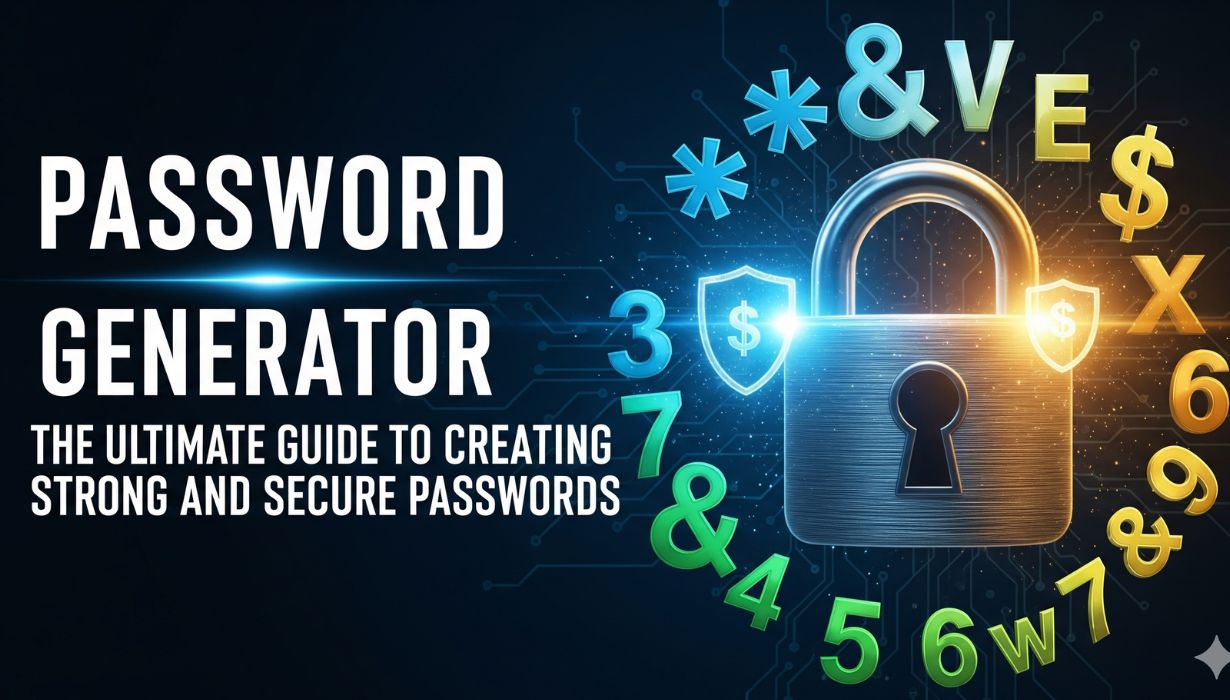
27
Password Generator Create Strong Secure & Random Passwords Online and with Code
Discover how a password generator helps you create strong and secure passwords Learn about online tools code examples in Python JavaScript PHP and best practices to protect your account
Password Generator The Ultimate Guide to Creating Strong and Secure Passwords
Introduction
In today’s digital world, your password is the first line of defense against cyber threats From online banking to email social media and cloud storage almost every service requires a login Yet, many people still rely on weak or repeated passwords making them easy targets for hackers
This is where a Password Generator becomes an essential tool A password generator creates random strong and unique passwords that are almost impossible to guess or crack Whether you’re an individual protecting personal data or a business safeguarding sensitive information, using a password generator is one of the smartest moves you can make
In this guide, we’ll cover everything you need to know about password generators: how they work why they matter, the different types available examples of code-based generators and the best practices for managing passwords securely
Why Password Security Matters
Cybersecurity experts estimate that milions of accounts are hacked every year due to weak or reused passwords Common mistakes include
Using simple paswords like 1236 or password
Reusing the same passord across multiple accounts
Storing passwords in insecure places like notes or browsers without encryption
Hackersuse techniques like brute force attacks dictionary attacks and phishing to exploit weak credentials A strong unique password dramatically reduces this risk
What is a Password Generator
A Password Generator is a tool that automatically creates complex passwords Instead of relying on human memory or creativity it uses algorithms to generate strings of characters that are
Random
Difficult to guess
Long enough to resist brute-force attacks
For example
Weak password: john123
Strong password (generated): Y7d#9qLp!A2zXw
The second example is much harder to crack because it uses length, randomness, and a mix of symbols
Features of a Good Password Generator
Not all password generators are equal The best ones offer
Customizable Length Choose between 12, 16, 24 or more characters
Character Variety Mix of uppercase lowercase numbers and symbols
No Predictable Patterns – Avoid dictionary words or personal info
Copy Protection – Some tools prevent automatic copying to reduce clipboard attacks
Offline Availability – Safer than online tools for sensitive accounts
Types of Password Generators
Online Password Generators
Web-based tools where you click “Generate” and get a new password
Convenient, but risky if used on insecure websites
Password Manager Generators
Built into apps like LastPass 1Password, or Bitwarden
Store and autofill your passwords securely
Command-Line Generators
Ideal for developers and system admins
Tools like openssl or pwgen generate strong passwords instantly
Custom Code Generators
Write scripts in Python, JavaScript, or PHP
Gives full control over complexity and rules
How Password Generators Work
Password generators use random number generators RNG and cryptographic functions to create unique combinations of characters Some use true randomness from hardware devices while others use pseudo-random algorithms that are still secure enough for everyday use
The generator selects characters from defined sets
Uppercase letters (A–Z
Lowercase letters (a–z
Numbers 0–9
Symbols ! @,#, $, %, ^, &, *
By mixing these sets the generator produces passwords that are both random and highly secure
Password Strength: Why Length and Complexity Matter
A password’s strength is determined by two key factors
Longer passwords require exponentially more time to crack
Complexity Using different character types makes guessing harder
For example:
6-character password (letters only) → crackable in minutes
12-character password (letters + numbers + symbols) → could take centuries with brute force
Best practice: Always use at least 12–16 characters
Common Mistakes with Password Generators
Not using them regularly Many people still create weak manual passwords
Reusing generated passwords defeats the purpose of randomness
Failing to store them safely Strong passwords are useless if written on sticky notes
Overcomplicating Some generated passwords may be unnecessarily long for basic accounts
Best Practices for Using Password Generators
Use at least 12 16 charaters for each password
Store passwords in a trsted password manager
Never use the sam password across multple accounts
Enable two factor authentication 2FA for extra security
Regularly update critical account passwords
Real-World Benefits of Password Generators
Indiviuals Protect personal data like emails banking, and shopping accounts
Businesses Secure employee logins, internal systems, and client data
Developers Sysadmins Generate API keys SSH passwords and server credentials
Healthcare Finance Protect sensitive records and comply with regulations like GPR or HIPAA
Password Generators vs Password Managers
Password Generator Creates strong random passwords
Password Manager Stores autofills and organizes all your passwords
Best strategy Use them together Generate strong passwords then store them securely in a manager
Conclusion
Weak passwords are the easiest entry point for hackers A Password Generator eliminates human error by creating strong random and unique passwords that resist brute force and dictionary attacks
From online tools to password manager apps command-line utilities and custom scripts there are countless ways to generate secure passwords The key is to use them consistently and combine them with good practices like 2FA and password manager
Contact
Missing something?
Feel free to request missing tools or give some feedback using our contact form.
Contact Us